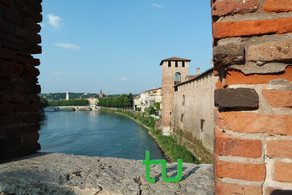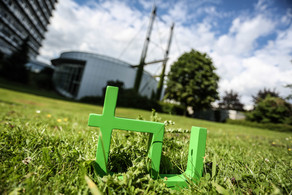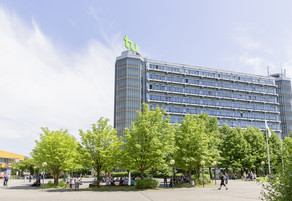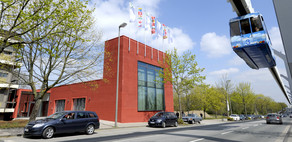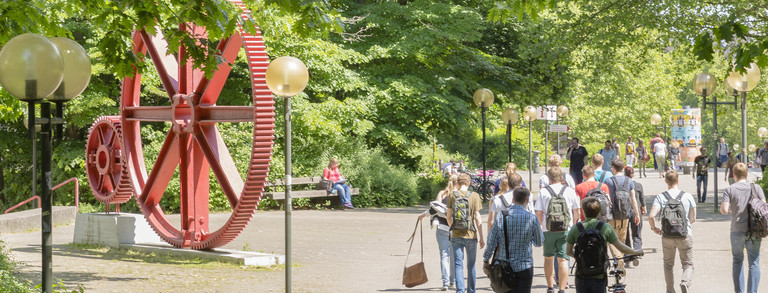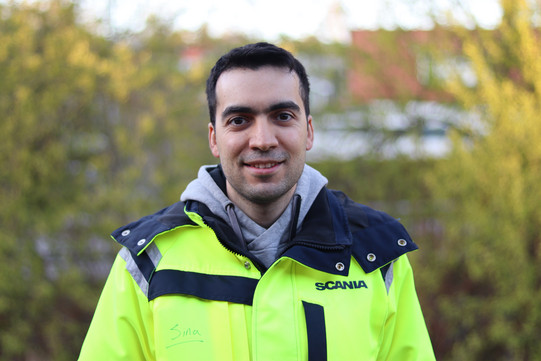“Germany helped to kick-start my career”
Sina Sharif Mansouri from Iran studied the Master’s degree program “Automation and Robotics” at TU Dortmund University from 2012 to 2014. In this interview, he talks about his time at TU Dortmund University, why the library is his favorite place on campus, and how coming to Dortmund changed his life.
How did your studies shape your life and career path?
After I completed my Bachelor’s degree in Electrical Engineering in Teheran, Iran, I applied for my Master’s degree program in 2012. I got offers from Germany, Norway, USA and Italy and then decided to come to Germany, because it is a capital of industry with world-leading companies. At TU Dortmund University, I studied Automation and Robotics and especially liked the courses taught by Prof. Sebastian Engell and Prof. Frank Hoffmann. I think Germany was a trigger point; a place that helped me to kick-start my career. In November 2021, I started my job as a research and development engineer at Scania, working on autonomous solutions for Scania trucks and buses. I do not think I would have the same opportunities if I had studied somewhere else.
Beyond that, staying in Dortmund was my first multicultural experience and I got to know different people from various countries and cultures. I made many friends, we are still in contact, and it is fun to see how the careers of different people go.
During my time in Dortmund, my life also changed because I met my future wife. She started her Master’s degree program in Dortmund in 2013 and we have been together ever since. We’ve been married for over two years now and our kid is now one year old.
Do you still have connections to Dortmund?
After I finished my Master in 2014, I moved to Sweden to start my PhD. Two years later, I took part in TU Dortmund’s International Alumni Reunion for alumni from the degree programs "Process Systems Engineering" and "Automation and Robotics", where I met friends and our professors. At the reunion I reconnected with lots of other graduates again, especially on a professional level. It was nice to see that some of them are working in very similar fields. There were also supporting networking events – and while I never had the chance to visit the BVB stadium during my studies, I finally managed to go there during the reunion.
What surprised you at the beginning of your studies or was completely unexpected?
Something I learned during that time and still sticks with me is to pay attention to details – especially when it comes to presentations, because my professors noticed even the smallest mistakes. Apart from that, I was surprised that the courses are very aligned with the industry’s requirements.
It was a new experience to do group projects with about ten people. Back in Iran, we also did group work, but with about two to three students. Therefore, I learned a lot about collaborations in smaller sub-teams but also in a bigger group.
One thing that was hard for me were German exams because your time was limited, which was not the case at my previous university. In Germany you need to be well-prepared and solve it in a short time, otherwise you can fail the exam.
Do you have a very special memory of your time at university?
With my old friends, I really like to talk about our ritual to go to the cafeteria for a break – sometimes with about ten people. We had our coffee there, relaxed and did not talk about studies for fifteen minutes.
Which is or was your favorite place on campus and why?
I think my favorite place was the library, because it was quiet and you could focus. We always went there to study; for short breaks and for discussions, we were going down to the first floor, put our laptops in the lockers and sat at the round tables near the entrance – it was fun. For chatting and having a pizza together, we also liked the “Sonnendeck” (today: food fakultät). Overall, I think me and my friends spent a lot of time in the library.
What would be your ultimate tip for new students today?
I think the ultimate advice is to learn German as good as you can. It is not just that life is getting easier; it actually opens you more doors for you at the end of the day because you will get more connections. As a student, you can learn languages much easier than during your work life because you are much more flexible with your schedule and to dos – when you find a job it is much harder to find proper time for language.
Another thing about housing: When I was in Iran, I wanted to have a one-room apartment and have my privacy. In Dortmund, I lived in a house with three other people, which I thought I did not like in the beginning – but at the end of the day, it was a good thing because I became friends with my roommates, they taught me new things and sometimes we talked for hours.
Moreover, just enjoy and trust the educational system, choose your path (for me it was Automation and Robotics), and follow it.
You Might also be Interested in:
Back to "Alumni International"
Find more information about TU Dortmund University's Alumni Network
More testimonials from international students:




